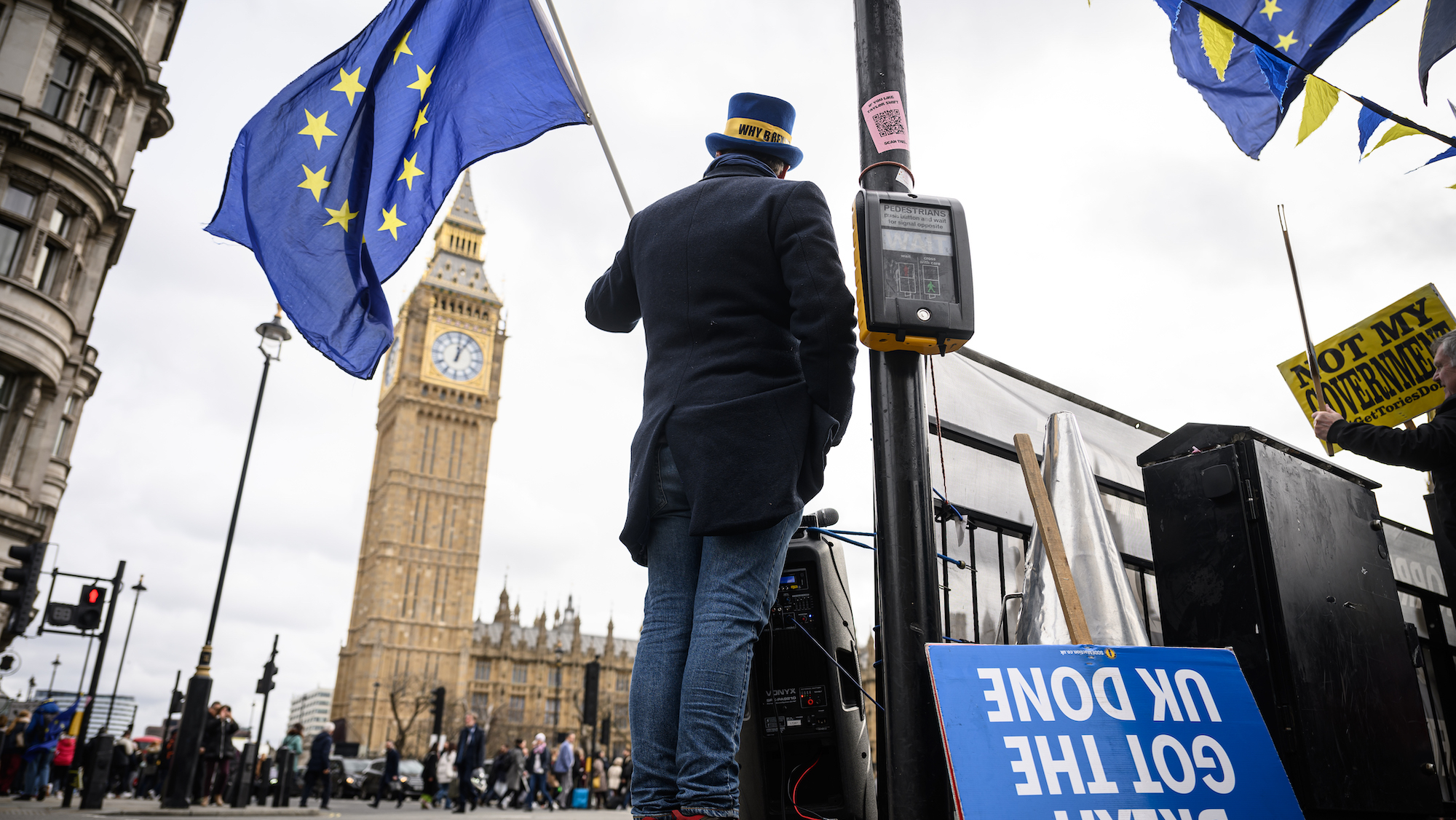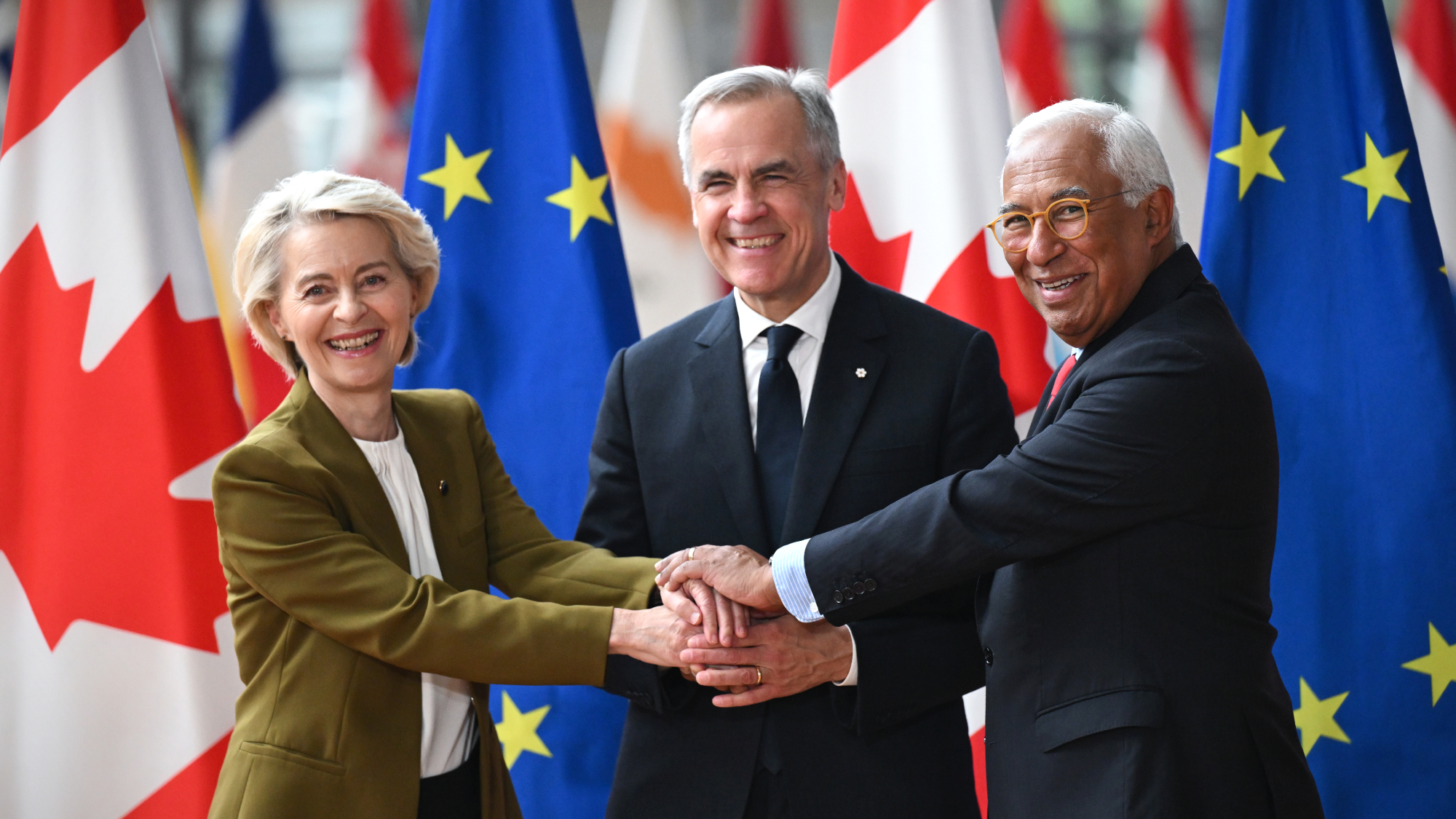Don't mention the B-word: why aren't politicians talking about Brexit?
It was the leading issue in the 2019 election, but Brexit has remained largely overlooked in this campaign

A free daily email with the biggest news stories of the day – and the best features from TheWeek.com
You are now subscribed
Your newsletter sign-up was successful
With just two weeks until the general election, the economy, the NHS, and immigration remain the main focal points of campaigning for Labour and the Conservatives. But the last general election's key issue, Brexit, has remained largely unmentioned by both.
It's clear that both leading parties have little "incentive to open what are seen as old wounds", said Greg Barradale in the Big Issue, but Britain's exit from the European Union remains a "major elephant in the room".
Yet, given that it is perhaps the "most momentous decision the UK has taken in a generation" it is still "very much a live issue" for voters, said Patience Wheatcroft in The New European. But Labour and the Tories have differing reasons for keeping it under wraps.
The Week
Escape your echo chamber. Get the facts behind the news, plus analysis from multiple perspectives.

Sign up for The Week's Free Newsletters
From our morning news briefing to a weekly Good News Newsletter, get the best of The Week delivered directly to your inbox.
From our morning news briefing to a weekly Good News Newsletter, get the best of The Week delivered directly to your inbox.
'A Brexit omertà'
For Rishi Sunak, the reluctance to discuss Brexit comes from a "diminishing number" of voters who believe it was a "good idea", as well as "repeated stories emphasising implementation problems", said Dan Sabbagh in The Guardian.
Moreover, while ministers have tried "to talk up the trade deals" they have signed since Brexit, "no normal voter cares about pork markets", said Helen Lewis in The Atlantic, and those who voted for Brexit to curb immigration will have been left "severely disappointed" given the rising numbers. Immigration numbers are a crucial issue for the Tories in this campaign, and they are reluctant to highlight how Brexit has "been a bust".
Labour leader Keir Starmer, who campaigned to remain, has made little commitment to "significant change" to Britain's "status outside the EU", added Sabbagh. There is a sense that the "topic has been suppressed" to win over Conservative voters, and Labour does not want to remind them of Starmer's former position in the referendum.
Likewise, Labour does not want to hand the Tories the opportunity to "fight the entire campaign on defending Brexit", wrote Peter Hutchinson at AFP, and threaten its potential majority in parliament. There is a sense, however, that if Starmer wins a significant majority then he will push for "closer alliances with Europe" and eventually put "Brexit back on the agenda".
A free daily email with the biggest news stories of the day – and the best features from TheWeek.com
One thing both parties have in common is the perception that Brexit has become "too dreadful even to be mentioned", said Wheatcroft, and the collective silence has been described as a "Brexit omertà" by Anand Menon of the thinktank UK in a Changing Europe.
'Just because something is dull doesn't make it unimportant'
While the two leading parties are reluctant to dwell on Brexit, there is a feeling that the electorate is tired of talking about it. With Brexit having been the leading issue in 2019, voters are now "bored with" it, said Lewis, and many are "enjoying the respite" having suffered "Brexit fatigue".
Indeed, even the Liberal Democrats, "committed Europhiles" who want to rejoin the EU, now "seem nervous about appearing too enthusiastic", said Wheatcroft, and the issue has been bumped back to the "final section" of their manifesto and is now a "longer-term objective".
Nigel Farage, who led the populist campaign to leave the EU, would also rather "talk about small boats crossing the Channel or the perils of a cashless society", said Lewis.
But just because "something is dull doesn't make it unimportant", and Brexit will soon be back on the table as a leading issue, said Simon Usherwood at The Conversation. The decision to ignore the issues now will have significant "consequences" in the future, he argued, and politicians will find themselves "having to firefight situations in the coming years" which have been created through turning a blind eye to Brexit.
Richard Windsor is a freelance writer for The Week Digital. He began his journalism career writing about politics and sport while studying at the University of Southampton. He then worked across various football publications before specialising in cycling for almost nine years, covering major races including the Tour de France and interviewing some of the sport’s top riders. He led Cycling Weekly’s digital platforms as editor for seven of those years, helping to transform the publication into the UK’s largest cycling website. He now works as a freelance writer, editor and consultant.
-
 The ‘ravenous’ demand for Cornish minerals
The ‘ravenous’ demand for Cornish mineralsUnder the Radar Growing need for critical minerals to power tech has intensified ‘appetite’ for lithium, which could be a ‘huge boon’ for local economy
-
 Why are election experts taking Trump’s midterm threats seriously?
Why are election experts taking Trump’s midterm threats seriously?IN THE SPOTLIGHT As the president muses about polling place deployments and a centralized electoral system aimed at one-party control, lawmakers are taking this administration at its word
-
 ‘Restaurateurs have become millionaires’
‘Restaurateurs have become millionaires’Instant Opinion Opinion, comment and editorials of the day
-
 Vietnam’s ‘balancing act’ with the US, China and Europe
Vietnam’s ‘balancing act’ with the US, China and EuropeIn the Spotlight Despite decades of ‘steadily improving relations’, Hanoi is still ‘deeply suspicious’ of the US as it tries to ‘diversify’ its options
-
 Does standing up to Trump help world leaders at home?
Does standing up to Trump help world leaders at home?Today’s Big Question Mark Carney’s approval ratings have ‘soared to new highs’ following his Davos speech but other world leaders may not benefit in the same way
-
 Biggest political break-ups and make-ups of 2025
Biggest political break-ups and make-ups of 2025The Explainer From Trump and Musk to the UK and the EU, Christmas wouldn’t be Christmas without a round-up of the year’s relationship drama
-
 ‘The menu’s other highlights smack of the surreal’
‘The menu’s other highlights smack of the surreal’Instant Opinion Opinion, comment and editorials of the day
-
 Moscow cheers Trump’s new ‘America First’ strategy
Moscow cheers Trump’s new ‘America First’ strategyspeed read The president’s national security strategy seeks ‘strategic stability’ with Russia
-
 Canada joins EU’s $170B SAFE defense fund
Canada joins EU’s $170B SAFE defense fundspeed read This makes it the first non-European Union country in the Security Action for Europe (SAFE) initiative
-
 Defeating Russia’s shadow fleet
Defeating Russia’s shadow fleetThe Explainer A growing number of uninsured and falsely registered vessels are entering international waters, dodging EU sanctions on Moscow’s oil and gas
-
 Believe it when AI see it: is this a deepfake turning point in politics?
Believe it when AI see it: is this a deepfake turning point in politics?Today’s Big Question AI ‘slopaganda’ is becoming a ‘feature’ of modern elections